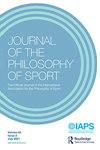The moral proximity of rooting
IF 1.7
3区 哲学
Q3 ETHICS
引用次数: 1
Abstract
ABSTRACT Rooting, defined as a spectator’s demonstrative encouragement of a contestant’s effort, ideally has the morally positive aspects of benevolent concern and helpfulness but in practice strains against reasonable standards of conduct by being rude, excessively biased, exploitative, fanatical, and superstitious. Rooting may activate an atavistic, morally cogent sense of fighting for one’s group that is at odds with the universalism of civilized morality. The ‘merely play’ excuse can cut both ways, deflecting moral objections but also removing moral credit from rooting. Although rooting is often not humane, humane rooting can occur and is supported by humane commentary by sports participants, broadcasters, and journalists. Humane rooting supports the premise of benevolence theories (Mengzi, Hutcheson) that morally ideal benevolence has a foothold in an innate general benevolence – seen in this area especially in benevolence toward efforts. Being partisan, excited, and demonstrative, rooters cannot perfectly embody ‘universal calm benevolence’, but they can consciously minimize the inhumane aspects of rooting and achieve a more fully prosocial satisfaction.扎根的道德接近
“扎根”被定义为观众对参赛者努力的示范性鼓励,理想情况下具有慈善关怀和乐于助人的道德积极方面,但在实践中却因粗鲁、过度偏见、剥削、狂热和迷信而违背了合理的行为标准。扎根可能会激活一种返祖的、道德上令人信服的为自己的群体而战的感觉,这种感觉与文明道德的普世主义相矛盾。“只是玩”的借口可以两全其美,既可以转移道德上的反对意见,也可以消除道德信用的根源。尽管扎根通常不人道,但人道的扎根是可以发生的,并得到体育参与者、广播公司和记者的人道评论的支持。人道主义根源支持了仁学理论(孟子,哈切森)的前提,即道德理想的仁学立足于天生的普遍仁学,尤其是对努力的仁学。扎根者具有党派性、兴奋性和示范性,不能完美地体现“普遍的平静仁爱”,但他们可以有意识地减少扎根的不人道方面,并获得更充分的亲社会满足。
本文章由计算机程序翻译,如有差异,请以英文原文为准。
求助全文
约1分钟内获得全文
求助全文
来源期刊

Journal of the Philosophy of Sport
Multiple-
CiteScore
1.90
自引率
14.30%
发文量
24
期刊介绍:
The Journal of the Philosophy of Sport (JPS) is the most respected medium for communicating contemporary philosophic thought with regard to sport. It contains stimulating articles, critical reviews of work completed, and philosophic discussions about the philosophy of sport. JPS is published twice a year for the International Association for the Philosophy of Sport; members receive it as part of their membership. To subscribe to either the print or e-version of JPS, press the Subscribe or Renew button at the top of this screen.
 求助内容:
求助内容: 应助结果提醒方式:
应助结果提醒方式:


